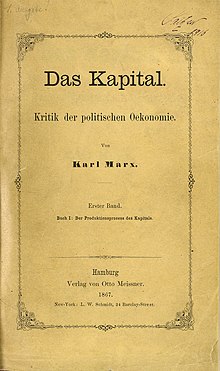
Back نقد الرأسمالية Arabic Crítica del capitalisme Catalan Kapitalismekritik Danish Kapitalismuskritik German Crítica del capitalismo Spanish Kapitalismoaren arazoak Basque نقد سرمایهداری Persian Critiques du capitalisme French Crítica ó capitalismo Galician Kritik terhadap kapitalisme ID

Criticism of capitalism is a critique of political economy that involves the rejection of, or dissatisfaction with the economic system of capitalism and its outcomes. Criticisms typically range from expressing disagreement with particular aspects or outcomes of capitalism to rejecting the principles of the capitalist system in its entirety.[1]
Criticism of capitalism comes from various political and philosophical approaches, including anarchist, socialist, Marxist, religious, and nationalist viewpoints. Some believe that capitalism can only be overcome through revolution while others believe that structural change can come slowly through political reforms. Some critics believe there are merits in capitalism and wish to balance it with some form of social control, typically through government regulation (e.g. the social market movement).
Prominent among critiques of capitalism are accusations that capitalism is inherently exploitative, alienating, unstable, unsustainable, and creates massive economic inequality, commodifies people, and is anti-democratic and leads to an erosion of human rights and national sovereignty while it incentivises imperialist expansion and war, and that it benefits a small minority at the expense of the majority of the population.
- ^ "Does the Left Have Any Better Ideas Than Obama's?". New York. Retrieved 28 December 2019.
© MMXXIII Rich X Search. We shall prevail. All rights reserved. Rich X Search